Questões de Língua Inglesa da Escola de Administração Fazendária (ESAF)
Lista completa de Questões de Língua Inglesa da Escola de Administração Fazendária (ESAF) para resolução totalmente grátis. Selecione os assuntos no filtro de questões e comece a resolver exercícios.
Your answers to questions 17 to 20 must be based on the article below entitled "Looming water crisis simply a management problem":
Looming water crisis simply a management problem
Source: www.newscientist.com August 20th 2008 (Adapted)
Today´s focus on the credit crisis and rising prices for food and oil has temporarily put another global scarcity in the shade: water. The UN predicts that by 2025, two-thirds of us will experience water shortages, with severe lack of water blighting the lives and livelihoods of 1.8 billion. According to the UN World Water Assessment Programme, by 2050, 7 billion people in 60 countries may have to cope with water scarcity. At this year´s World Economic Forum, UN secretary-general Ban Ki-moon recommended that water scarcity should be at the top of the international agenda. "As the global economy grows, so will its thirst," he said, warning of a future marred by conflicts over water.
There is no doubt that we need to rethink how we use water, especially with the human population growing rapidly, and global warming likely to produce unpredictable patterns of rainfall and drought. Nevertheless, my own research suggests that the situation may not be as dire as many are suggesting. Nations can thrive on surprisingly meagre quantities of fresh water – provided they adopt water-efficient technologies and encourage economic activity that does not guzzle water. I believe the looming water crisis is primarily a problem of distribution and management rather than supply. And we can solve it with existing technologies, increased investment and political will.
In paragraph 2, the author says that based on his own research, the situation
- A.
should have been resolved.
- B.
must be promptly addressed.
- C.
could have been hindered.
- D.
may bring about catastrophic shifts.
- E.
might not be so severe.
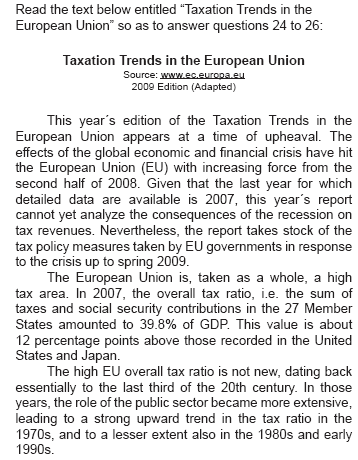
According to paragraph 1, the global economic and financial crisis
- A.
has impacted on the EU.
- B.
may still hit the European Union.
- C.
has caused tax reductions in the EU.
- D.
could have affected the EU.
- E.
might bring about growth in the EU.
Your answers to questions 17 to 20 must be based on the article below entitled "Looming water crisis simply a management problem":
Looming water crisis simply a management problem
Source: www.newscientist.com August 20th 2008 (Adapted)
Today´s focus on the credit crisis and rising prices for food and oil has temporarily put another global scarcity in the shade: water. The UN predicts that by 2025, two-thirds of us will experience water shortages, with severe lack of water blighting the lives and livelihoods of 1.8 billion. According to the UN World Water Assessment Programme, by 2050, 7 billion people in 60 countries may have to cope with water scarcity. At this year´s World Economic Forum, UN secretary-general Ban Ki-moon recommended that water scarcity should be at the top of the international agenda. "As the global economy grows, so will its thirst," he said, warning of a future marred by conflicts over water.
There is no doubt that we need to rethink how we use water, especially with the human population growing rapidly, and global warming likely to produce unpredictable patterns of rainfall and drought. Nevertheless, my own research suggests that the situation may not be as dire as many are suggesting. Nations can thrive on surprisingly meagre quantities of fresh water – provided they adopt water-efficient technologies and encourage economic activity that does not guzzle water. I believe the looming water crisis is primarily a problem of distribution and management rather than supply. And we can solve it with existing technologies, increased investment and political will.
In paragraph 2, the author implies that the problem of distribution and management of water is
- A.
overestimated.
- B.
paramount.
- C.
marginal.
- D.
extraneous.
- E.
secondary.
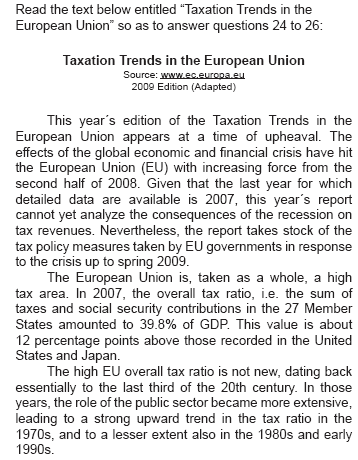
In relation to the EU´s overall tax ratio, it
- A.
must hit 39.8% of GDP.
- B.
is likely to reach 39.8% of GDP.
- C.
is soon to be defined.
- D.
exceeds half the GDP.
- E.
equals to 39.8% of GDP.
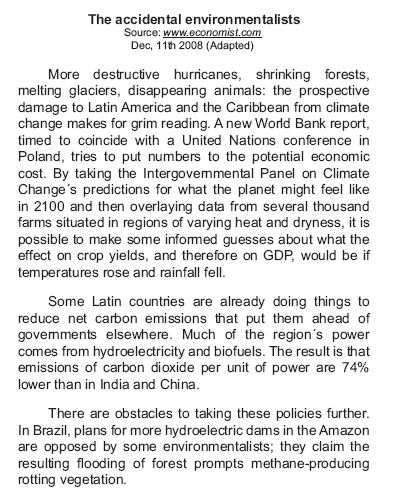
As regards the potential economic cost caused by climate change, figures
- A.
are going to be presented.
- B.
cannot be set.
- C.
would have to be shown.
- D.
seem to minimize its effect.
- E.
do not reflect its dire threat.
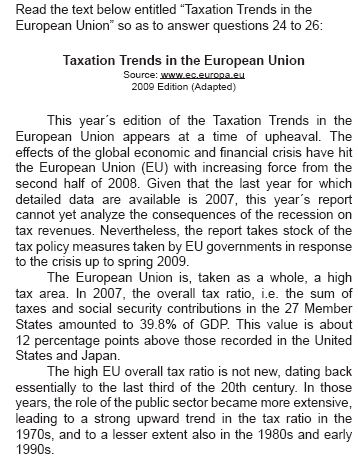
According to paragraph 3, the role played by the public sector
- A.
widened.
- B.
lessened.
- C.
diminished.
- D.
faded.
- E.
decreased.
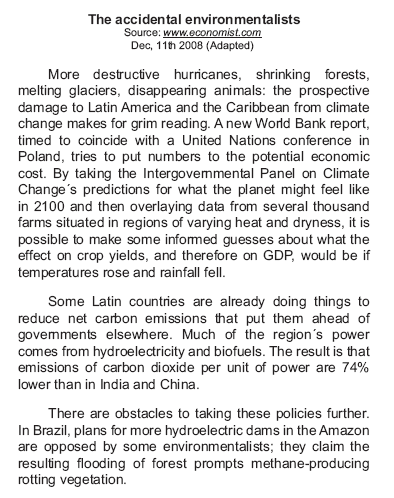
In some Latin American countries, carbon dioxide emissions per unit of power
- A.
are unacceptably high in relation to other countries.
- B.
are considerably lower than those of India and China.
- C.
have increased signifificantly over the last few decades.
- D.
are being tackled through the construction of new capacity.
- E.
need to be reduced by around 74% as soon as possible.
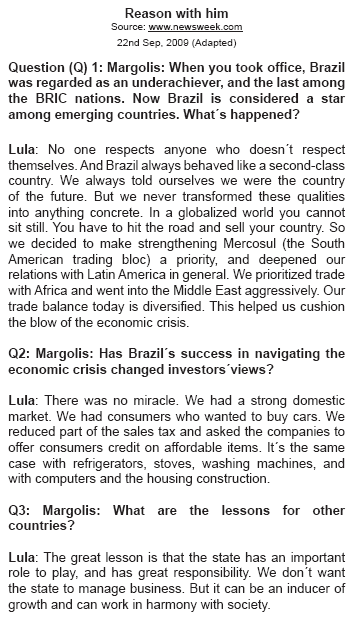
In his answer to question 1, Brazil´s president refers to "strengthening Mercosul as a priority." In other words, a measure he considered
- A.
risky.
- B.
unattainable.
- C.
pivotal.
- D.
unnecessary.
- E.
advisable.
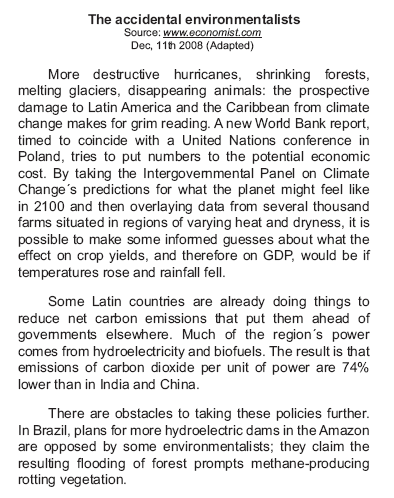
In relation to the constructions of hydroelectric dams in the Amazon, some environmentalists
- A.
support and supervise them.
- B.
have prevented them.
- C.
devised a number of them.
- D.
do not approve of them.
- E.
take part in their initial plan.
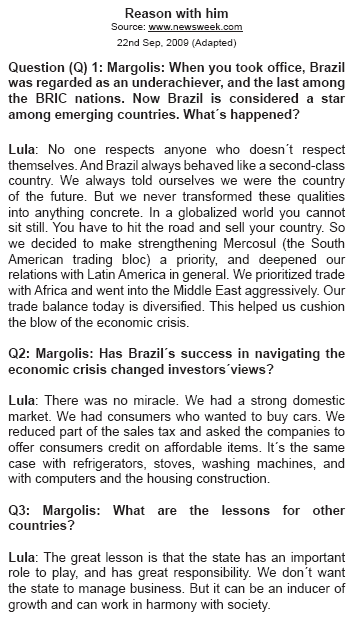
In his answer to question 2, Luiz Inácio Lula da Silva says that
- A.
the Brazilian domestic market was frail.
- B.
a miracle did come about in Brazil.
- C.
credit on affordable items was halved.
- D.
part of the sales tax was lowered.
- E.
consumers were not willing to spend.


